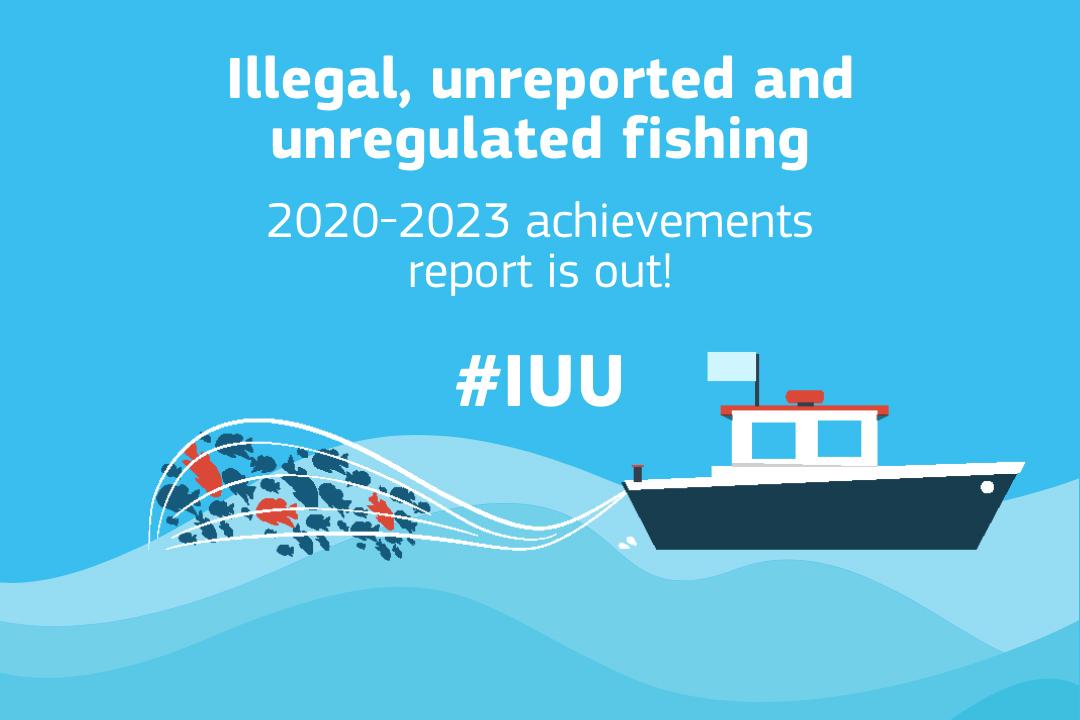Fighting illegal, unreported and unregulated fishing: new report on 2020-2023 achievements
Fighting illegal, unreported and unregulated fishing: new report on 2020-2023 achievements European Union


The European Commission’s Report on Preventing Illegal, Unreported, and Unregulated Fishing

The European Commission has just published the 2020-2023 report on its activities to prevent, deter, and eliminate illegal, unreported, and unregulated fishing (IUU fishing), in accordance with the IUU Regulation.
Improved Traceability and Digital Tools for IUU Controls
One of the main achievements is the amended IUU Regulation, adopted within the revision of the EU fisheries control system.
The amendments introduced the IT system CATCH, which will support the implementation of the EU IUU catch certification scheme for imported fishery products. EU importers and Member States’ authorities will be using CATCH from 2026, while non-EU countries can join voluntarily.
Commissioner for the Environment, Oceans and Fisheries Virginijus Sinkevičius said:
“CATCH will contribute to a better protection of the EU market and its consumers against imported products obtained from IUU fishing. This IT system has the potential to become a reference point as a digital environment for catch documentation schemes and international trade flows of fishery products thanks to its web-based approach and considerable interoperability opportunities.”
These amendments also modify the content of the catch certificate and accompanying documents to improve traceability and facilitate IUU controls of fishery products destined for the EU market.
Moreover, measures applying to non-cooperating countries in the fight against IUU fishing have been reinforced.
Collaboration at International Level
Between 2020 and 2023, the Commission actively cooperated and provided support to international partners to promote fisheries compliance and fight against IUU fishing. This was done through bilateral IUU dialogues with non-EU countries, IUU working groups, and regional and multilateral frameworks.
The Commission has also played an essential role in promoting anti-IUU fishing measures within Regional Fisheries Management Organisations (RFMOs) and actively advocated for the ratification and effective implementation of the Food and Agriculture Organisation (FAO) Port States Measures Agreement in all its external fisheries relations, including through financial support to the FAO.
Background
Since the application of the IUU Regulation in 2010, the EU has come to be recognized worldwide as a major player in the fight against IUU fishing.
A ‘zero tolerance’ approach to IUU fishing is implemented under the EU control system of the common fisheries policy (CFP) and the EU’s updated International Ocean Governance agenda. The IUU Regulation contributes to efforts to eliminate IUU fishing in line with the EU’s commitment to goal 14 of the 2030 Sustainable Development Agenda.
This periodic report provides an update on the main achievements in the application of Council Regulation (EC) No 1005/2008 establishing a Community system to prevent, deter, and eliminate IUU fishing. It fulfills the reporting requirement under the IUU Regulation and is based on submissions by Member States, the Commission’s own observations, and its assessment of any relevant information since 2020.
The IUU Regulation is based on two pillars:
- the catch certification scheme, which uses traceability to apply import controls to prevent fishery products stemming from IUU fishing entering the EU market, and
- the bilateral cooperation with non-EU countries, which strengthens fisheries governance in partner countries and helps them comply more effectively with their regional and international obligations. The EU approach to preventing, deterring, and eliminating IUU fishing is embedded in international fisheries law and, in addition to the IUU Regulation, builds on the Control Regulation, the Sustainable Management of External Fleets Regulation, and the implementation in EU law of measures established by Regional Fisheries Management Organisations.
The revision of the EU fisheries control system was successfully concluded at the end of 2023. In the context of the revision, targeted amendments to the IUU Regulation laid down a legal obligation to use digital tools to implement the catch certification scheme and strengthened IUU import controls by improving the traceability of products imported into the EU.
More Information
- 2020-2023 report on its activities to prevent, deter and eliminate illegal, unreported and unregulated fishing
- Illegal fishing – European Commission
- Fisheries Control System
- Regulation (EU) 2023/2842 of the European Parliament and of the Council of 22 November 2023 amending Council Regulation (EC) No 1224/2009, and amending Council Regulations (EC) No 1967/2006 and (EC) No 1005/2008 and Regulations (EU) 2016/1139, (EU) 2017/2403 and (EU) 2019/473 of the European Parliament and of the Council as regards fisheries control
SDGs, Targets, and Indicators Analysis
1. Which SDGs are addressed or connected to the issues highlighted in the article?
- SDG 14: Life Below Water – The article discusses the EU’s efforts to prevent, deter, and eliminate illegal, unreported, and unregulated fishing (IUU fishing), which aligns with SDG 14’s goal of conserving and sustainably using the oceans, seas, and marine resources.
2. What specific targets under those SDGs can be identified based on the article’s content?
- Target 14.4: By 2020, effectively regulate harvesting and end overfishing, illegal, unreported, and unregulated (IUU) fishing, and destructive fishing practices and implement science-based management plans, in order to restore fish stocks in the shortest time feasible – The article highlights the EU’s efforts to prevent, deter, and eliminate IUU fishing through the amended IUU Regulation and improved traceability measures.
3. Are there any indicators mentioned or implied in the article that can be used to measure progress towards the identified targets?
- Indicator 14.4.1: Proportion of fish stocks within biologically sustainable levels – The article mentions that the EU’s control system and IUU Regulation aim to restore fish stocks by regulating harvesting and ending IUU fishing.
Table: SDGs, Targets, and Indicators
| SDGs | Targets | Indicators |
|---|---|---|
| SDG 14: Life Below Water | Target 14.4: By 2020, effectively regulate harvesting and end overfishing, illegal, unreported, and unregulated (IUU) fishing, and destructive fishing practices and implement science-based management plans, in order to restore fish stocks in the shortest time feasible | Indicator 14.4.1: Proportion of fish stocks within biologically sustainable levels |
Behold! This splendid article springs forth from the wellspring of knowledge, shaped by a wondrous proprietary AI technology that delved into a vast ocean of data, illuminating the path towards the Sustainable Development Goals. Remember that all rights are reserved by SDG Investors LLC, empowering us to champion progress together.
Source: oceans-and-fisheries.ec.europa.eu

Join us, as fellow seekers of change, on a transformative journey at https://sdgtalks.ai/welcome, where you can become a member and actively contribute to shaping a brighter future.







